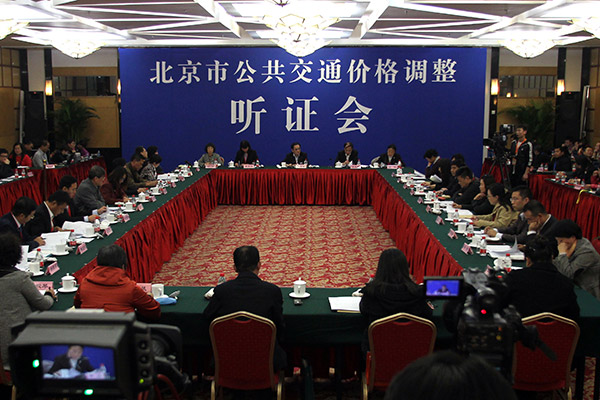
Representatives at the public hearing for the adjustment of Beijing’s public transport prices on Oct 28 discuss price increases that they all agreed with.[Photo by Zou Hong/China Daily]
Representatives voice support for plan that includes discounts for frequent users.
Beijing will likely increase the price for subway tickets to a starting price of 3 yuan, the first price hike in seven years, while bus fares will go up to 2 yuan after representatives voiced their support and suggestions at a hearing on Oct 28.
The 25 representatives, including consumers, employees in bus and metro companies, officials in traffic bureaus and traffic experts, all agreed with the price increase, and mostly favored the second plan of price adjustments.
Under that plan, which was released in July, a single trip on the metro will go up to a starting price of 3 yuan, and will be capped at a maximum of 9 yuan. The starting price for a bus ticket will be 2 yuan, with a 9-yuan maximum.
A passenger will get discounts based on how much he or she spends monthly on the subway, and will get a 50 percent discount for using a traffic card to take a bus.
The average price for a single trip on the subway would rise to 4.3 yuan. The current flat price is 2 yuan.
Subway travel would account for 5.4 percent of the average per-capita disposable monthly income of Beijing residents, up from the current 2.6 percent, if the plan is adopted.
“The traffic card carriers, like me, have gotten used to swiping cards and enjoying the discounts, so the second plan that offers discounts is easier to accept,” said Kong Linghai, a 63-year-old representative.
A commuter who takes the bus and metro every day said the increased expense is acceptable, as long as it can provide more comfortable journeys, instead of crowded cabins and buses.
In the future, minor adjustments of mass transit prices will be made annually according to a comprehensive set of factors including fuel charges and economic growth, said Li Hong, an official with the Beijing Development and Reform Commission. A thorough review of the pricing system, with adjustments as needed, will be conducted every five years, Li said.
No details about the flexible pricing system were disclosed at the hearing.
While the representatives agreed that a price increase was needed, they put forward many suggestions, including extending distances allowed for a given price, and providing more buses and routes to cater to passengers’ demands.
